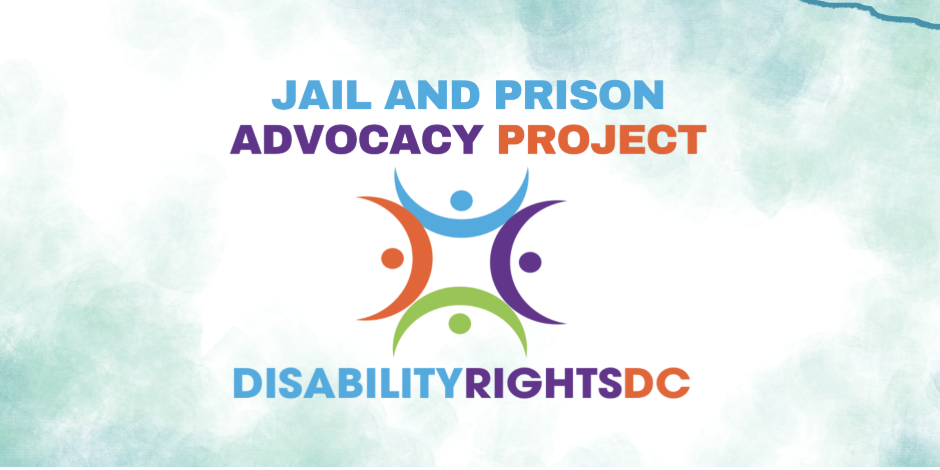JPAP's 2025 Spring Newsletter
The shifting political landscape has been casting doubt on many of the funding sources and critical services that our clients rely on. We know that many are facing economic uncertainty, but if you are in a place to give, JPAP's advocacy work depends on support from individuals like you. Your generosity ensures that we will continue to advocate for people with mental illness and intellectual disabilities who are returning to our DC community after incarceration.
Remembering Donald Hines
It is with deep sadness that we share the passing of our dear colleague, Donald Hines. Donald was an integral part of the Jail and Prison Advocacy Project (JPAP) team at ULS, bringing dedication, kindness, and a strong commitment to our mission.
As a Peer Navigator, Donald worked tirelessly to provide support to JPAP clients navigating the challenges of reentry, ensuring that every individual received the advocacy and resources they deserved. Guided by his own experiences with the carceral system, Donald was inspired to become an advocate, spending a great deal of time learning ways to elevate his voice against discrimination.

After returning home in 2020, he received reentry assistance from JPAP, which affirmed his commitment to supporting those who might find themselves in similar circumstances. Donald participated in JPAP’s short-lived reentry housing, which provided stability that Donald said made all the difference in the world. While residing at the Nehemiah Project, he trained to become a Peer Specialist. He knew he wanted to support others in his position. From there, Donald was selected to participate in the Georgetown University Jordan Peer Recovery Training Program, part of the PIVOT program. His dedication to the program earned him an internship and subsequent employment with Total Family Care Coalition (TFCC). In 2024, Donald came full circle, joining University Legal Services as a Peer Navigator to help others on the same journey he once traveled.
Within our office, Donald found not just a career, but a community and a sense of purpose. “We save lives!” he explained to people who asked about his work. He was deeply committed to uplifting those around him, always going beyond the call of duty to support others in becoming productive and empowered members of society. Donald loved his job and was loved by his colleagues. One of Donald’s simple yet cherished traditions was passing out bubble gum to everyone in the office—a small act of kindness that brought smiles to many. In his memory, his colleagues continue this tradition, a reminder of his generosity and the joy he shared with those around him.
Donald’s presence will be deeply missed, but his legacy of compassion and advocacy will live on in the lives he touched. Donald is survived by his beloved wife, Teri Hines, who was a constant, steady presence in his life.
Congress Wants to Cut Medicaid. Here's What That Means for JPAP.
The House budget resolution, passed last month on April 10, calls on the House Energy and Commerce Committee to propose historic budget cuts that could impact Medicaid. Nearly a quarter of Washington, D.C. residents depend on Medicaid, and it is a lifeline for the people we serve at the Jail & Prison Advocacy Project—returning citizens with psychiatric disabilities, intellectual disabilities, traumatic brain injuries, and co-occurring substance use disorders.
All of our clients are Medicaid recipients. Over 90% of our clients are chronically unhoused and people of color, making access to Medicaid-funded services essential for their successful reentry into the community. Any cuts to Medicaid threaten to dismantle the critical supports that keep our clients housed, healthy, and out of the criminal legal system.
What's at stake?
Medicaid funds vital services that make independent living possible, including:
- Mental health and substance use treatment – All of our clients rely on Medicaid for therapy, medication, and recovery programs. Without coverage, untreated mental health conditions and addiction increase the risk of incarceration. Mental health services are essential for our clients, and all people experiencing housing insecurity.
- Home and community-based services (HCBS) – These services provide in-home care, case management, and support for daily living. Cuts would push more people into costly, restrictive institutions.
- Housing support – Medicaid is a key source of funding for all of the housing programs that help our clients transition out of shelters and into stable homes. Without it, homelessness rates will rise.
How would this affect JPAP?
Work requirements for Medicaid recipients do not result in increased employment; instead, multiple studies show that the additional bureaucracy results in eligible people losing their only health insurance because they struggle to keep up with the reporting requirements. While many members of Congress may view these people as “able bodied,” that only means they do not meet the stringent requirements for disability under Social Security’s rules. JPAP clients may be denied SSI even though they have, for example, a long record of treatment-resistant schizoaffective disorder and multiple physical health problems that affect their ability to work. It can take two years to go through Social Security’s appeal process, during which the individual is considered not disabled.
If Medicaid is slashed using onerous paperwork requirements for proof of work and more frequent recertification, JPAP clients will face even more barriers to securing essential services for our clients. Waitlists will grow longer, fewer providers will accept Medicaid, and many returning citizens will struggle to access basic care. This not only puts individuals at risk—it undermines public safety and the fight for disability justice by increasing recidivism and deepening cycles of poverty and incarceration.
Take action
Medicaid cuts don’t just hurt individuals—they harm entire communities. Advocating for fully funded Medicaid is crucial to protecting the dignity and rights of returning citizens with disabilities. Stay informed, speak out, and help us fight for a system that works for all. We especially encourage advocacy from people who live outside of DC, in states such as Maryland and Virginia. Click the link below to contact your representitives now!
D.C. Medicaid by the numbers:
285,000+ PEOPLE ENROLLED IN D.C. MEDICAID. 95,000 INFANTS COVERED UNDER MEDICAID. 28,000 SENIORS COVERED BY MEDICAID. 27,000 PEOPLE WITH DISABILITIES COVERED BY MEDICAID. 24% OF D.C.'S POPULATION IS COVERED BY MEDICAID/ CHILDREN'S HEALTH INSURANCE PROGRAM.
Data from the DCHS Monthly Medicaid and Alliance Enrollment Reports
Client Art Feature


These illustrations were submitted by a current JPAP client.
Act Now! Oppose cuts to Medicaid- House Votes Tomorrow.
House leadership is fast-tracking a bill that would gut Medicaid —putting the lives of returning citizens with disabilities at risk. These cuts would rip away access to mental health care, housing support, and critical services that make reentry possible.
The House Rules Committee meets at 1:00 a.m. this Wednesday to advance the “One Big Beautiful Bill,” which ties massive tax cuts to deep cuts to Medicaid. These changes would devastate access to care while increasing bureaucracy, especially for low-income people with disabilities. We can’t let Congress push this through without accountability.
What You Can Do to Help & How to Contact Your Elected Officials
📣 Call your representative today—especially if you live in Maryland, Virginia, or other states outside of DC. Tell them:
- Vote NO on any budget that cuts Medicaid.
- Protect access to care for returning citizens with disabilities.
- Reject work requirements that punish people with serious mental and physical health conditions
Use this script to talk to Congressional offices on the phone. To send a letter automatically to all of your representatives at once, use this letter-sending tool from Caring Across Generations or this letter-sending tool from The Arc of the United States. Add some personal information into the message text if you would like.
Tell your elected officials, “Hands Off Our Medicaid!”
- Use this search tool to find out who your elected officials are.
- Fill in your address.
- Select “Federal Officials.”
- Select each of the names listed.
- The contact information for your representatives will appear.
- Call the phone number listed, and use the sample call script.
Send Your Own Letter
Go to the representative’s website that is listed in the search tool. Select “Contact.” Either send the letter to the email address listed or fill out the contact form. Then, copy and paste your letter into the “Message” field.
💡 Key Republicans to contact:
Some Republicans have privately raised concerns about Medicaid but haven’t taken a public stand. Advocates are urging calls to:
- Rep. Maria Salazar (FL)
- Rep. Jeff Van Drew (NJ)
- Rep. Andrew Garbarino (NY)
- Rep. Nick LaLota (NY)
- Rep. Nicole Malliotakis (NY)
- Rep. Brian Fitzpatrick (PA)
- Rep. Rob Bresnahan (PA)
- Rep. Jen Kiggans (VA)
- Rep. Rob Wittman (VA)
- Rep. David Valadao (CA)
- Rep. Young Kim (CA)
- Rep. Jeff Hurd (CO)
- Rep. Don Bacon (NE)
- Rep. Monica De La Cruz (TX)
- Rep. Tony Gonzales (TX)
- Rep. Dan Newhouse (WA)
- Rep. Derrick Van Orden (WI)
Don't let Congress quietly trade away our health for billionaire tax cuts. Speak up now—our communities are depending on it.
Thank You to Our Supporters!
At the Jail & Prison Advocacy Project , our work advocating for incarcerated and returning citizens with disabilities is only possible because of the generosity of our donors. Your support helps us fight for access to critical services, secure housing and reentry resources, and ensure the dignity and rights of our clients.
We would like to extend a special thank you to The Rosendin Foundation for their recent contribution to our mission. Their support strengthens our ability to serve some of DC’s most marginalized residents and push for systemic change.
To all our donors—thank you. Your commitment to justice and disability rights fuels our work every day. Together, we are making a difference.
Consider supporting our work by making a recurring or one-time donation on our website!
.png)





